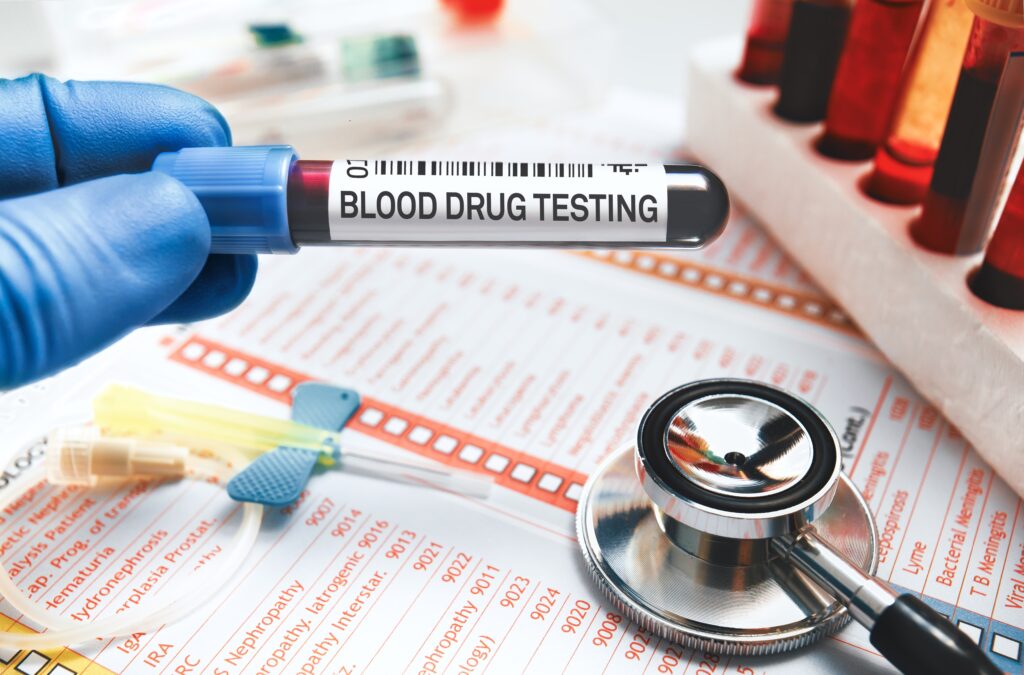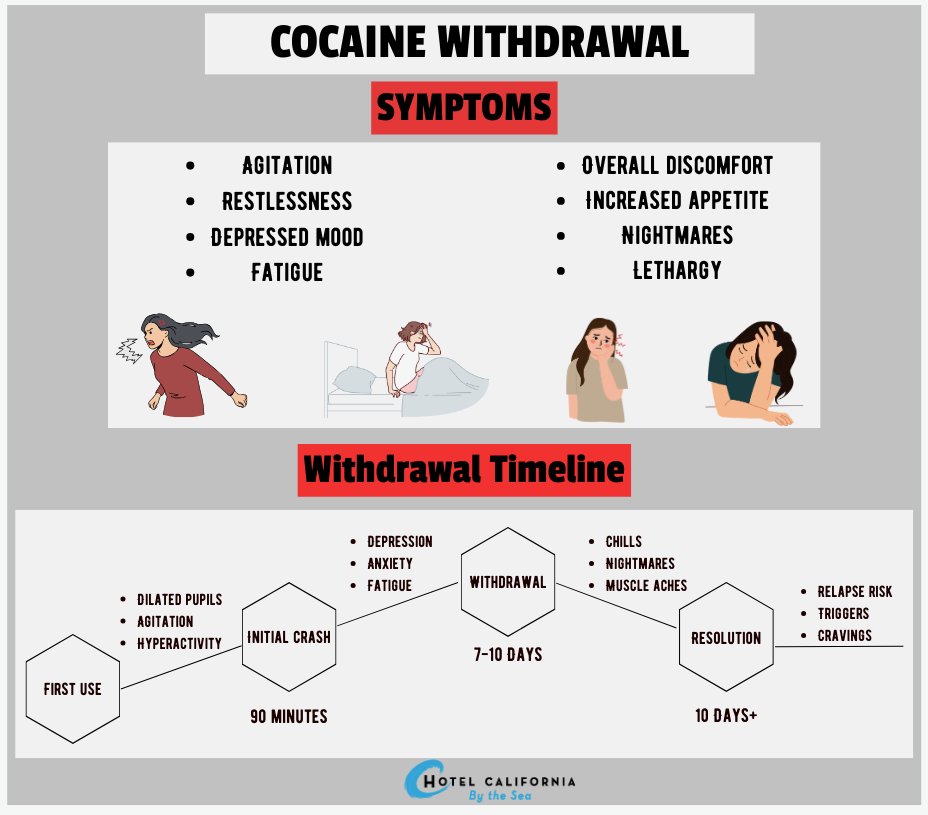How long does Cocaine stay in your Blood?
Cocaine is a powerful central nervous system stimulant drug that is highly potent and extremely habit-forming. Cocaine is a Schedule II Controlled Substance and is a popular recreational drug. Dependence and addiction to cocaine can occur rather quickly due to the effects of the drug. Cocaine increases levels of dopamine in the brain. Dopamine is a brain chemical associated with movement and reward. When large amounts of dopamine build up in the brain, it reinforces the cocaine drug-taking behavior. This can lead to tolerance and dependence in which a user will need to increase their dose along with frequency of dose in order to achieve the same effects. Increased drug dose and drug frequency will ultimately lead to addiction.

Short-term side effects of cocaine include euphoria, high energy, increased mental alertness, and sensitivity to sight, sound and touch. However, once cocaine abuse begins, users can begin experiencing constricted blood vessels, dilated pupils increased body temperature, increased heart rate and increased blood pressure. Other symptoms that can occur include anxiety, depression, paranoia, panic, restlessness and cardiovascular issues that can put the user at risk for heart attack and stroke.
Because of cocaine’s habit-forming properties, testing for cocaine is also very common. According to the Drug and Alcohol Testing Industry Association, generally, cocaine can remain detectable between 2-10 days after the initial drug dose. Despite being able to fully metabolize within a few days, the drug can leave behind remnants or metabolites of cocaine that can still be detected despite the drug being eliminated from the body.
How long does cocaine stay in your Blood?
How long does cocaine stay in the body? How long does cocaine stay in your blood? The duration in which the substance remains in the body varies between each user. There are many different factors that contribute to drug duration such as size of dose, speed of individual metabolism, mechanism of drug intake, whether or not it is the first time taking the drug and if they are a frequent user of cocaine.
Cocaine drug tests are usually testing for metabolites. Metabolites are chemicals in the body that are produced when cocaine is broken down. The user may no longer experience the high and effects of the drug, but can still test positive for cocaine metabolites within their system. Cocaine’s half-life is generally around 1 hour. It takes about 4-5 half-lives to completely eliminate the drug from the system. The drug is metabolized fairly quickly compared to other stimulant drugs. This means the detection window for cocaine itself is only a few hours, while cocaine metabolites can be detectable between 5-7 hours.
Drug testing for cocaine usually only detects trace amounts of the drug or its metabolites in a person’s system. A drug test has the ability to find even the smallest amounts of the drug. The most common way to test for cocaine is usually with a urine test. Cocaine can remain detectable in urine for up to 4 days after the initial drug dose.

Cocaine will go through many different changes before being removed from the body. When it is ingested, the liver will break down the drug into two different substances: benzoylecgonine and ecgonine methyl ester. Benzoylecgonine is the most common cocaine metabolite form that is detected in urine tests and is usually flushed out in the kidneys. Ecogonine methyl ester is another chemical that gets grouped with other chemicals sent out into the body through urine.
Blood testing can also detect cocaine. However, blood testing is not as common of a test and can yield invasive results. This is because blood tests are dependent on the amount of cocaine used, method of administration and frequency of cocaine use. Heavy and frequent cocaine use can prolong the detection window for the drug in the bloodstream because the body processes the drug more slowly in these chronic users. Blood concentrations of cocaine can reach peak levels 5 minutes after smoking the drug compared to 30-40 minutes after snorting the drug. The difference in reaching peak levels in the bloodstream between the two methods of ingestion varies greatly.
Blood testing for cocaine looks for the actual drug or cocaine metabolites in the blood plasma. This type of test has the shortest detection window. Because of this, cocaine can only remain detectable in blood for 1-2 days after initial drug use. Blood testing is usually only used to measure if someone is currently under the influence of cocaine rather than if they have recently been using the drug. It offers very few advantages over saliva and urine testing, which are the preferred methods when testing for cocaine.
Check Your Insurance Coverage for FREE
Find out if your insurance covers addiction treatment in minutes. We accept most insurance!
How long do the effects of Cocaine last?
Different methods of administration can lead to a difference in the onset of effects as well as the duration of cocaine effects. The difference in time at which you feel the effects of cocaine is dependent on the speed at which the drug enters your bloodstream.
When you snort or rub cocaine on your gums, you can feel the effect within 1-3 minutes. Snorting and gumming cocaine means the drug has to pass through your mucus, skin and other tissues before making its way into the bloodstream. The effects of snorting or gumming the drug last between 15-30 minutes.
When you smoke or inject cocaine, you can feel the effects within a matter of seconds. This method of drug use puts the cocaine directly into the bloodstream. Inhaling cocaine results in an onset of effects within about 7 seconds. When injecting, the onset of effects is about 15 seconds. The high from smoking or injecting cocaine lasts between 10-20 minutes.
When you orally ingest cocaine, you can feel the effects in about 10 minutes. The effects of ingesting cocaine last around 60 minutes. The duration of effects is different for everyone. Some people can feel the effects for as long as an hour. Some people feel the effects for 15-30 minutes. How much of the drug is used and whether other substances were used can impact the duration of a cocaine high.
Reach out to Hotel California by the Sea
We specialize in treating addiction and other co-occurring disorders, such as PTSD. Our Admissions specialists are available to walk you through the best options for treating your addiction.
Treatment for Substance Use Disorder
Cocaine can remain detectable in the body for as long as two weeks. Cocaine is broken down quickly compared to other stimulant drugs and despite being removed from the body, there are still metabolites that can linger and remain detectable in drug tests. Urine tests are the most common way to test for cocaine. Blood samples can also be used but are often reserved for specific situations due to their limited detection window. Blood can only hold cocaine for about 12 hours and cocaine metabolites for about 48 hours. This makes blood testing limited when testing for cocaine.
Developing a cocaine addiction can lead to serious consequences. The most effective way to treat and overcome a cocaine addiction is with the help of a professional behavioral health treatment program such as Hotel California by the Sea. We provide excellence in care to clients in all stages of treatment including detox, residential, PHP and IOP. We utilize evidence-driven treatment methods including CBT, DBT and family therapy. Hotel California by the Sea is dedicated to treating every aspect of addiction including physical, psychological and emotional factors that impact addiction. Our rigorous and intensive program will provide the tools and resources for our clients to overcome their addiction and live a happier life in recovery.
References:
https://www.healthline.com/health/how-long-does-cocaine-stay-in-your-system
https://www.medicalnewstoday.com/articles/how-long-does-cocaine-stay-in-your-system
https://www.drugrehab.com/addiction/drugs/cocaine/cocaine-in-system
https://zinniahealth.com/substance-use/cocaine/duration
https://www.epiphanywellnesscenters.org/cocaine-treatment/how-long-does-cocaine-stay-in-your-system
https://www.bicyclehealth.com/blog/how-long-does-cocaine-stay-in-your-system
